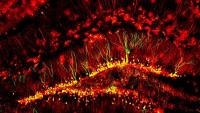Research Projects

The Role of Apolipoprotein E (ApoE) in Developmental and Injury-Induced Neurogenesis
ApoE is an apolipoprotein that is essential for the normal metabolism of lipids. Through unknown mechanisms, the presence of the human allele ApoE4 is the highest known risk factor for developing late-onset Alzheimer’s disease. Interestingly, the presence of ApoE4 is also a predictor for poor outcome after TBI. We have shown that ApoE is a negative regulator of hippocampal neurogenesis and we are currently investigating how ApoE regulates injury-induced neurogenesis and affects cognitive recovery from brain injury.
Mechanisms of Injury-Induced Neurogenesis
Although injury-induced hippocampal neurogenesis has been well described for many years. There have been few mechanistic links to understanding why. The microenvironment of the hippocampus is complex, particularly after injury, and is comprised of activated astrocytes, activated microglia, and impairments in the blood brain barrier. We are dissecting out individual components such as activated microglia to determine what factors produced by microglia might function to either enhance or impair neurogenesis.
Tracking the Connectome of Newly-Generated Dentate Gyrus Neurons
New neurons form in the dentate gyrus during normal adult development as well as in response to injury. Evidence from our lab and others suggest that these new neurons can both facilitate repair after injury and also contribute to morbidity. It remains unknown how these neurons connect to the existing circuitry within the brain, and understanding how this occurs may provide insight into whether. We are utilizing temporally and spatially specified fate-labeling as well as retroviruses that can deliver tracers across synapses to determine the connectome of both normal and injury-induced hippocampal neurogenesis.